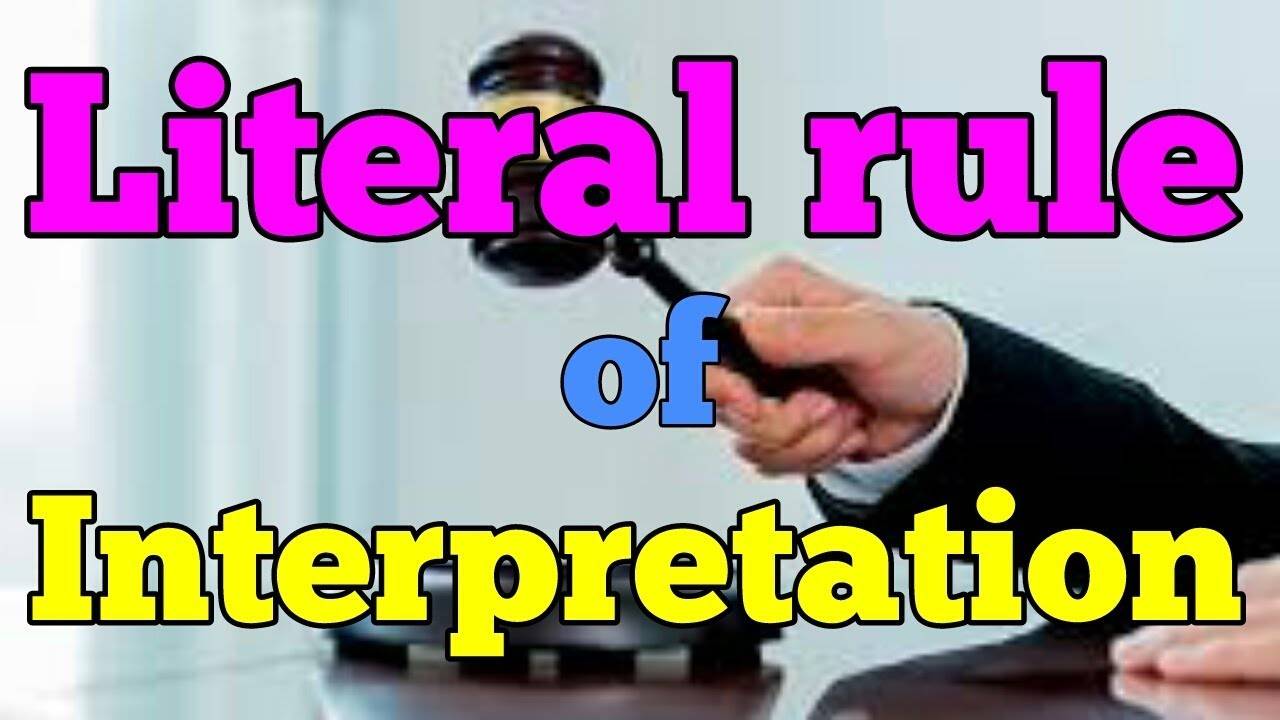INTRODUCTION
The Literal Rule is a part of the statutory rules of interpretation. It tends to be one of the primary rule to be applied by the Judges. By the Literal rule words in the statute must be given their plain and literal meaning. The main aim of the court is to discover the intention of the parliament as expressed in the words used. This approach will be used even if in case it produces absurdity or hardship, in which case the remedy is for Parliament to pass an amending statute.
In the case of R v. Judge of the City[1], Lord Es has stated that “If the words of an Act are clear then you must follow them and even though they lead to a manifest absurdity. The court has nothing to do with the question whether the legislature has committed an absurdity”.
The author, hereby have referred to various landmark case law for the better understanding of the Literal Rule of Interpretation.
In the case of Cutter v. Eagle Star Insurance Company Limited[2] the Claimant was injured in a car. The Defendant Insurance Co. Insurance only covered him under the Road Traffic Act, 1988 for the use of his car “on any high way and any other road to which the public has access”. The issue for the court to determine was, Whether the multi – storey building car parking was a road? By applying the Literal rule of interpretation it was held by House of Lords that – the car park was not a road because a road provides for cars to move along it to a destination. Hence, the Star Insurance Co. was not liable to pay to the Claimant, as he was not injured due to the use of car on “road”, but was injured on multi storey building.
In the case of Whiteley v. Chappell[3], also known as Dead Person Case, where the defendant was arrested for impersonating a dead person in order to cast an extra vote.
Provision: A statute aimed at preventing election rigging made it an offence to impersonate “any person entitled to vote” at an election.
Issue involved was whether he was guilty of casting an extra vote? It was therefore held that he was not found guilty as dead person clearly entitled to vote.
The Literal rule was also applied in the case of London and North Eastern Railway v. Berriman[4], in this case a railway worker was knocked down and killed by a train whilst oiling parts of the line. His wife was trying to claim compensation for his death.
Provision: The relevant statute said that compensation was available for workers who were “..killed whilst repairing the line…”. The question of law was – Whether the widow is entitled for the compensation? The court hence, held that in the ordinary sense of the word, “repairing” did not include oiling as this was merely maintenance.
In the case of Motipur Zamindari Company Private Limited v. State of Bihar[5]the issue before the Court was whether sugarcane can fall under the term “green vegetables”, reason being, if it would`ve fallen within the term “green vegetables” the same would then be exempted from the Bihar Sales Tax Act, 1947.The Court had taken Literal rule of interpretation and observed that the word “vegetable” was to be understood as a common parlance that is denoting class of vegetable which were grown in a kitchen garden or in a farm and were used for the table. The dictionary defines sugar cane as a grass, hence it was not exempted under the Act. Similar issue was also raised in the case of State of West Bengal and ithers v. Washi Ahmed,[6]the question before the court was whether Ginger comes under the ambit of green vegetable. The Sales tax authorities levied sales tax on “green ginger” which were sold by the respondents, taking the view that green ginger is used to add flavor and taste to food. It was hence, concluded that Green ginger is included within the meaning to the term “vegetable” or “tarkari”.
ADVANTAGES
It respects the supremacy of parliament, as the role of the Judge is to apply the words of Parliament and not to make law. It restricts the role of the judges and provides no scope for the judges to use their own opinion and prejudices. It is also advantageous when the words under discussion are not vague, clear, lacking ambiguity or broadness.
DISADVANTAGES
There can be a disagreement as to what amounts to the ordinary meaning. It fails to recognize the complexities and the limitations of English language and assumes every Act is perfectly drafted. It sometimes lead to injustice, and creates loopholes.
[1] R v. Judge of the City [1892] 1 QB 273.
[2] Cutter v. Eagle Star Insurance Co. Ltd, [1998] 4 All 417.
[3] Whiteley v. Chappell, (1868) LR 4 QR 147.
[4] London and North Eastern v. Berriman, (1946) AC 278.
[5] Motipur Zamindari Co. Pvt. Ltd v. State of Bihar, AIR 1962 SC 660.
[6] State of West Bengal & others v. Washi Ahmed, AIR 1977 SC 1638.
Author: PRANJALI PANDYA,
Damodaram Sanjivayya National Law University, Visakhaptnam,

